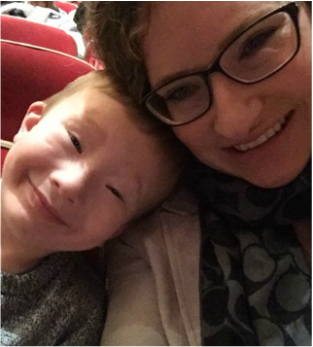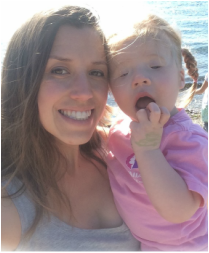I used to joke that I felt like a famous person when I would go out with my twins. The huge double stroller drew a lot of attention. However, comments about my “sleepy baby” really started to annoy me and as he got older and it became evident to people that he wasn’t sleeping sitting up, the stares became obvious and hurtful.
It has taken me a long time to accept that BPES is a part of our life. When my twins were born early at 34 weeks we all wondered when my son would open his eyes. The neonatologists told me not to worry, that preemies were very sensitive to light and he would open his eyes with time. As a new mom with two infants who were born early, I was overwhelmed and shifted my concerns to the back of my mind but I knew from the very beginning that something was different. As my son grew, so did my concern. By four months of age, I started to do my own research and when I came across BPES I knew that was the explanation for his features. Our pediatrician wasn’t necessarily concerned but honored my request for a referral to a pediatric ophthalmologist. She confirmed his diagnosis within five minutes of seeing us. She handed us a stack of papers about BPES and sent us on our way. As a genetic counselor I had the background to understand his diagnosis but it was the mom part of me that felt so alone, so scared, and so overwhelmed. Since then, we have changed pediatricians, changed ophthalmologists, and were so lucky to find the most amazing oculoplastic surgeon with a wonderful bedside manner, all of whom assured us that everything was going to be fine.
Making the decision for Jack to have surgery was the hardest choice we have ever had to make. I remember everything about that day- how brave, but quiet he was, how silly he was after they gave him the versed and how I fell apart as soon as they wheeled him away. Seeing him for the first time broke my heart; his face was so swollen, bruised and red. Getting him to take his antibiotics and stay still was a challenge. The day he exclaimed to me with enthusiasm as we were driving in the car “momma, I can see!” was the day I had my affirmation that we made the right choice. Since his surgery the staring and the questions have gone to a minimum. Part of this, I think is because of Jack’s personality. He has the biggest smile and the friendliest attitude that people don’t have time to wonder about his eyes because they are already busy getting to know this sweet, bright, enthusiastic, inquisitive, amazing little boy. I still have some fears and worry for the future but with time I have learned to let Jack take the lead and to take my cues from him.
There has been one instance in his almost six years where another kid was mean to him because of his eyes. He was playing with this kid at a park, with his sunglasses on, and when he took his sunglasses off the kid immediately started calling him names (alien) and telling him he was weird and he didn’t want to play with him anymore. This was heartbreaking to watch and Jack was simply confused. This was a tough day for both of us but I tried to remind him of the confidence he has in himself and of all the people who love him and think he is amazing. He still remembers this day. I worry about how people’s stares, questions and mean comments will affect him. As we have prepared to start kindergarten this year I’ve used the following tips with Jack and his twin sister as well:
Though the early years had some worry, fear, anger and grief, I have come to whole heartedly accept the BPES, because it comes with this:
It has taken me a long time to accept that BPES is a part of our life. When my twins were born early at 34 weeks we all wondered when my son would open his eyes. The neonatologists told me not to worry, that preemies were very sensitive to light and he would open his eyes with time. As a new mom with two infants who were born early, I was overwhelmed and shifted my concerns to the back of my mind but I knew from the very beginning that something was different. As my son grew, so did my concern. By four months of age, I started to do my own research and when I came across BPES I knew that was the explanation for his features. Our pediatrician wasn’t necessarily concerned but honored my request for a referral to a pediatric ophthalmologist. She confirmed his diagnosis within five minutes of seeing us. She handed us a stack of papers about BPES and sent us on our way. As a genetic counselor I had the background to understand his diagnosis but it was the mom part of me that felt so alone, so scared, and so overwhelmed. Since then, we have changed pediatricians, changed ophthalmologists, and were so lucky to find the most amazing oculoplastic surgeon with a wonderful bedside manner, all of whom assured us that everything was going to be fine.
Making the decision for Jack to have surgery was the hardest choice we have ever had to make. I remember everything about that day- how brave, but quiet he was, how silly he was after they gave him the versed and how I fell apart as soon as they wheeled him away. Seeing him for the first time broke my heart; his face was so swollen, bruised and red. Getting him to take his antibiotics and stay still was a challenge. The day he exclaimed to me with enthusiasm as we were driving in the car “momma, I can see!” was the day I had my affirmation that we made the right choice. Since his surgery the staring and the questions have gone to a minimum. Part of this, I think is because of Jack’s personality. He has the biggest smile and the friendliest attitude that people don’t have time to wonder about his eyes because they are already busy getting to know this sweet, bright, enthusiastic, inquisitive, amazing little boy. I still have some fears and worry for the future but with time I have learned to let Jack take the lead and to take my cues from him.
There has been one instance in his almost six years where another kid was mean to him because of his eyes. He was playing with this kid at a park, with his sunglasses on, and when he took his sunglasses off the kid immediately started calling him names (alien) and telling him he was weird and he didn’t want to play with him anymore. This was heartbreaking to watch and Jack was simply confused. This was a tough day for both of us but I tried to remind him of the confidence he has in himself and of all the people who love him and think he is amazing. He still remembers this day. I worry about how people’s stares, questions and mean comments will affect him. As we have prepared to start kindergarten this year I’ve used the following tips with Jack and his twin sister as well:
- Kids build confidence in themselves when they succeed in activities and are recognized for their abilities rather than their appearance. It has always been important for us to have Jack involved in activities that he enjoys.
- Teaching kids and their siblings how to explain their differences (very simply) to their peers, because often times kids are just curious. I have taught Jack to simply respond with “this is how my eyes were made but I can see just fine, want to play?” It can be helpful to talk to teachers to explain as well so that they aren’t wondering and can help facilitate answering questions at school if needed.
- It is important for parents to be low key about their kid’s differences. While I worry, I keep this worry to myself. I don’t want to increase Jack’s anxiety or worry based on my feelings, and I don’t want to demonstrate to him that this is a big deal, because really, it isn’t.
- If all else fails I have taught my kids that they can ignore mean people and walk away.
- I’ve also explained to my kids that it is normal to notice people’s differences and that if they have questions about someone’s difference then they can always ask me.
Though the early years had some worry, fear, anger and grief, I have come to whole heartedly accept the BPES, because it comes with this:
Written by Jessica Adsit, mother of a 5 year old with BPES.



 RSS Feed
RSS Feed